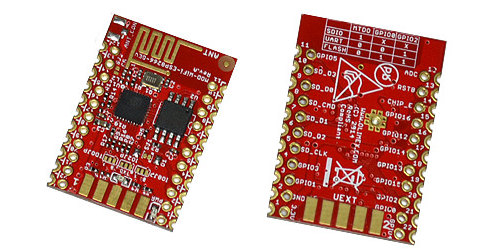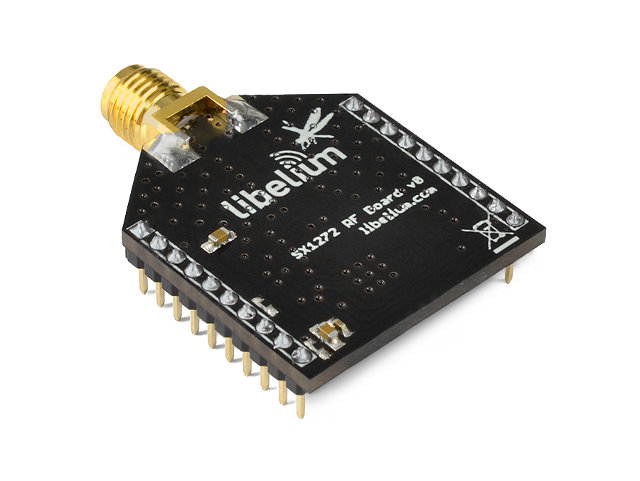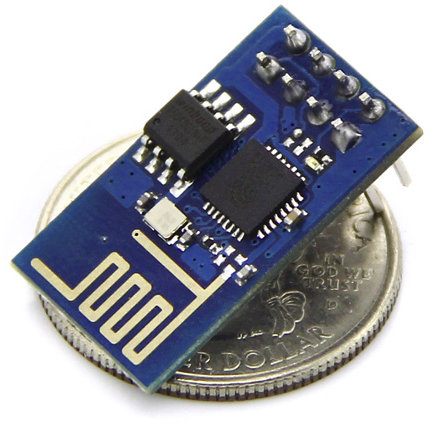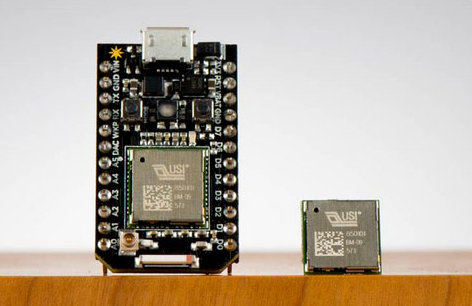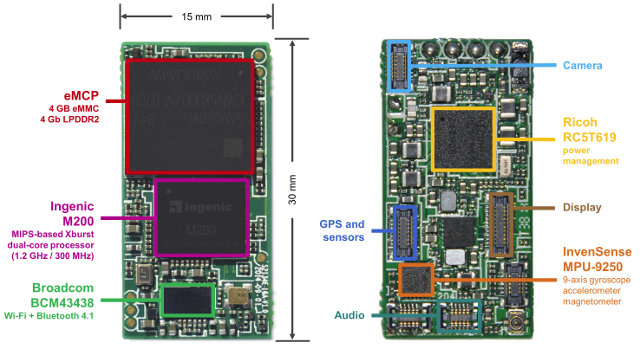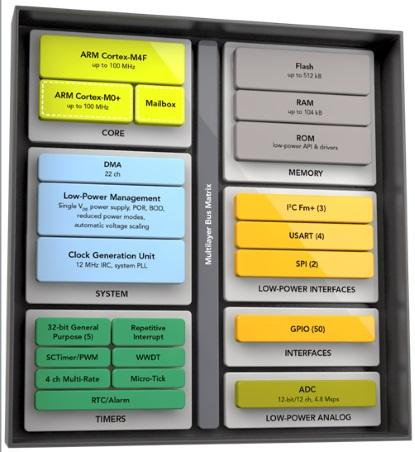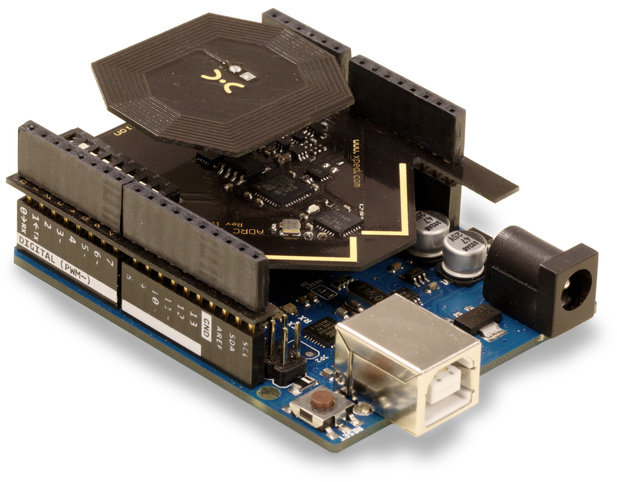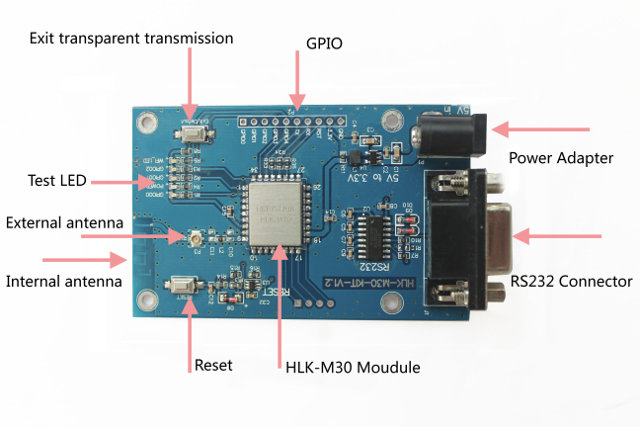ESP8266 has become popular as module based on this SoC make it incredibly cheap to add Wi-Fi to all sort of things, the SDK available, and a community has gathered around the solution. Olimex has jumped on the bandwagon, and is now provided two open source hardware ESP8266 modules: MOD-WIFI-ESP8266 which makes it easy to interface to other Olimex boards thanks to its UEXT connector, and MOD-WIFI-ESP8266-DEV with two rows of 0.1″ connectors and an unsoldered UEXT pad, is better suited if you want to integrate it with your own baseboard, or experiment with a breadboard. An evaluation board called MOD-WIFI-ESP8266-EVB will be launched a little later. Both modules share most specifications: SoC – Espressif Systems ESP8266 32-bit RISC processor with 802.11 b/g/n support(32-pin QFN package), Wi-Fi – 802.112 b/g/n with WEP, TKIP, AES, and WAPI engines, Wi-Fi direct (P2P), and soft-AP. On-board antenna and u.FL connector Expansion MOD-WIFI-ESP8266 – […]
Semtech LoRa SX1272 RF Module Enables Up to 30 KM Wireless Range for Arduino, Raspberry Pi, Waspmote, and More
Libelium’s Waspmote is a board based on Atmel ATmega1281 MCU that interfaces with over 80 sensors, and various wireless communication modules, and targets professional wireless sensor network applications such as irrigation systems, smart metering, smart cities, smartphone detection, building automation, and so on. They have some professional kits for over 3,000 Euros including training, but a more affordable Starter Kit is also available for 199 Euros on Cooking Hacks. But I’m not going to cover Waspmote in details today. I just mention it because of an article on embedded.com mentioning compatibility with a Libelium / Semtech LoRa SX1272 RF module delivering up to 30km range in ideal conditions (and usually 22+ km range in LOS), and about 2km range in urban settings. I previously featured XBee-PRO 900HP RF Module with a 45km range, so the Semtech module is just another option, and it works not only with Waspmote, but also the […]
Add Wi-Fi to Arduino Boards for $3 with ESP8266 Wi-Fi Serial Module
There has been some buzz around ESP8266 Wi-Fi module, mostly because of its low price, and SDK availability, meaning it could become the Wi-Fi equivalent of ENC28J60 Ethernet module, and that for $5 you could potentially add Wi-Fi to your Arduino board for example. Since then, the price has come down even further, and if you are prepared to buy 5 pieces, you can now get the module for less than $3 / piece shipped, alternatively a single module costs $4, and a complete Wi-Fi + Arduino Uno (clone) kit goes for $15. A community has also been built around the chip, and a several project have been made with Arduino boards and ESP8266 module. The best way to find information is to go to ESP8266 community forum, as well as read the Wiki on github. There’s currently a GCC toolchain for Espressif Systems ESP8266, open source tools for working […]
Spark Photon is a $19 Hackable IoT Wi-Fi Board
Spark Core is a popular Wi-Fi module for the internet of things with a community of over 20,000 developers, but at $39 it may have started to feel a little expensive compared to the new IoT Wi-Fi modules such as ESP82666 or xWiFi, so the company has unveiled a new Wi-Fi board called Photon that’s smaller, better, and cheaper. Let’s compare Spark Core with the new Spark Photon. Feature Spark Core Spark Photon Wi-Fi Support 802.11 b/g 802.11 b/g/n Wi-Fi Setup Smart Config Soft AP Wireless Module TI CC3000 Broadcom BCM43362 MCU STM32F103 STM32F205 MCU Speed 72 MHz 120 MHz Flash Memory 128 KB 1 MB RAM 20 KB 128 KB GPIO 18 UART (Serial) Yes JTAG Yes I2C Yes SPI Yes ADC Yes DAC No Yes CAN No Yes VBAT pin exposed No Yes Wakeup pin exposed No Yes Price $39.00 $19.00 So beside slashing the price by 50%, […]
Ingenic Unveils Newton2 Platform for Wearables with M200 Dual Core SoC
Ingenic Newton is a development platform for wearables powered by Ingenic JZ4775, an application processor mostly used in tablets. Many companies are now making SoCs speficially designed for wearables with a powerful application core, and a low power core serving as a sensor hub, an Ingenic M200 SoC found in the new Ingenic Newton2 platform, uses the sample principle by combinging a MIPS XBurst processor @ 1.2GHz with a low power MIPS XBurst core @ 300MHz combined with low power GPU and VPU. Ingenic Newton2 specifications: SoC – Ingenic M200 dual core processor with MIPS XBurst @ 1.2 GHz, MIPS XBurst @ 300 MHz, 2D/3D GPU, and VPU supporting H.264, VP8, MPEG-1/2/4, VC-1, and RV9 up to 720p30 System Memory – 512 MB LPPDR2 (Samsung eMCP) Storage – 4GB eMMC (Samsung eMCP) Connectivity – 802.11 b/g/n Wi-Fi + Bluetooth 4.1 (Broadcom BCM43438) + connector for GPS Sensors – Gyroscope, accelerometer, magnetometer […]
NXP Introduces LPC54100 Single & Dual Core Cortex M4F/M0+ MCU Family and LPCXpresso54102 Development Kit
NXP has recently introduced LPC54100 Series microcontrollers with a Cortex-M4F core up to 100MHz, and optionally an ARM Cortex M0+ core for always-on sensor processing applications, as well as LPCXpresso 54102 board. Typical applications include mobile, portable health and fitness, home and building automation, fleet management and asset tracking, robotics and gaming. Key features of LPC54100 series MCUs: CPU – 32-bit ARM Cortex-M4F up to 100 MHz, optional 32-bit ARM Cortex-M0+ coprocessor On-chip RAM – 104 KB internal RAM On-chip Storage – Up to 512 KB on-chip Flash Interfaces 3 fast-mode plus I²C, 4 UART, 2 SPI, 39 GPIO ADC with up to 12-channels, 12 bits, and 4.8 Msps sample rate, full-spec (1.62 V to 3.6 V) Clock Sources – IRC, digital clock input, PLL, 32 kHz XTAL, WWDT Timers – 5x 32-bit general-purpose timers/counters, One-state configurable timer/PWM, RTC with alarm, and WWDT 22-channel DMA with 20-programmable triggers Power consumption […]
Connect Objects Wirelessly, and Create User Interfaces Easily With Xped DeB for Arduino (Crowdfunding)
Xped, an australian startup, has designed an ecosystem comprised of an Arduino shield with NFC and 802.15.4 connectivity, a Raspberry Pi Model B+ based gateway, and DeB browser that generates a user interface in Android, iOS, or Linux based on an XML file stored in an Arduino board. This allows to connect various objects wirelessly, with reduced power consumption thanks to 802.15.4, and to create user interfaces easily with a text file located in your Arduino board. ADRC stands for Auto-Discovery Remote Control, and that’s what Xped ADRC Shield allows thanks to the following hardware specifications: MCU – RM Cortex M3 32-bit microcontroller with 256 KB of FLASH memory. NFC – NDEF Type-2 Tag with bi-directional communications capability. NFP proximity communications technology which is similar to NFC but was developed by Xped to use less than 1,000th of the power and provide faster speeds than NFC. It is mainly used […]
Hi-Link HLK-M30 StartKit Based on Mediatek MT7681 WiSoC Sells for $10
Here’s yet again another low cost Wi-Fi board for the internet of things with Hi-Link HLK-M30 StartKit featuring an HLK-M30 Wi-Fi module powered by Mediatek MT7681 SoC, exposing 5 GPIOs, and a serial RS-232 DB9 interface. AFAICR, it’s the second MT7681 board featured on CNX Software after xWiFi. Key feature of HLK-M30 Wi-Fi module and Starter Kit: SoC – Mediatek MT7681 WiSoC Wi-Fi Standards – 802.11b/g/n Wi-Fi encryption: WEP/WPA-TKIP/WPA-AES/WPA2-TKIP/WPA2-AES STA/AP mode Protocols supported by MT7681 – TCP Server/Client, UDP Server/Client, DHCP, DNS, HTTP Internal and external antennas Serial – DB9 connector for RS-232 Expansions 2.54mm through holes for 3.3V/GND, Tx/Rx, and GPIO 1 0 to 4. 4-pin SPI interface to flash firmware to IC (not usable by end users) Misc – Test LEDs Power – 5V power barrel Dimensions – 14.1 x 16.5 x 2.25 mm (Module size). PCB size: Unknown. Documentation including User’s manual and AT command sets, windows […]


